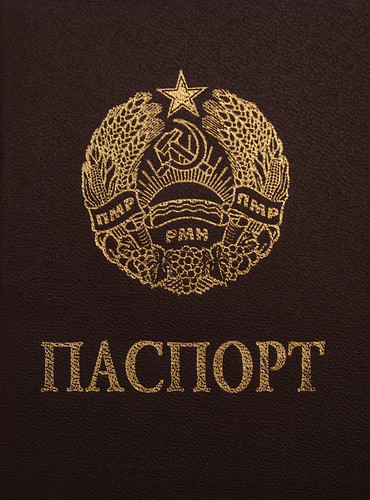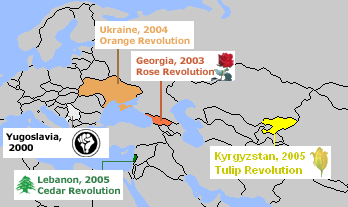Twitter revolution – no coup d’etat but big drama anyway
 Twitter revolution did not change government in Moldova but created big drama instead including a couple of conspiracy theories and “fast-track” mini enlargement of EU with one million new EU citizens while same time Moldova possibly losing a quarter its citizens. So a relatively small improvised demonstration can lead its (mis)use for possible purposeful utilization of multidimensional aims of different players.
Twitter revolution did not change government in Moldova but created big drama instead including a couple of conspiracy theories and “fast-track” mini enlargement of EU with one million new EU citizens while same time Moldova possibly losing a quarter its citizens. So a relatively small improvised demonstration can lead its (mis)use for possible purposeful utilization of multidimensional aims of different players.
In my post "Twitter Revolution-Case Moldova" I described a bit implementation and motivations about events occurred after 5th April elections in Moldova. Conclusions about elections itself are in my post "Election in Moldova – Nato Perspective blocked”.
…about 200 people was arrested and nobody know where they are now ... communist president had a meeting will all school and university deans, and told them that they'll be fired if police catch one of their students at protest….also they close borders with Romania, and don’t let international journalists to enter in country. 3 journalists was denied entry in airport…2 Moldavian journalists disappeared after they filmed undercover police beating students...while in Chisinau people was protesting and fighting, national tv had on a documentary film...
On the other hand demonstration has been characterized also as an act where
youth, paid by older internationally-acting manipulators with money, alcohol and drugs, seized a presidential office, planted a Romania’s flag on a president palace and set on fire country’s parliament, demanding inclusion as a province in Romania.”
Conspiracy 1
The first conspiracy theory came public April 14th by Eurasian Secret Services Daily Review. According its sources flags of Romania and EU over Moldova’s presidential office building were run up by employees of Moldavan secret services. The Flags of Romania and the European Union which have been run up on April 7, over the building of the Moldova’s presidential office during the protest actions against falsifications of parliamentary elections, were raised up at presence of a policeman, a source in the Information and Security Service (SIS) of Moldova told news agency Regnum April 14th. According to the source, the flag of Romania overt the building was raised by an employee of the SIS. (Source AXIS)
Conspiracy 2
Few days later April 16th Moldavian President Vladimir Voronin expressed totally opposite conspiracy theory claiming that nine Serb nationals took part in organising the coup d’état in Chisinau, adding that the Moldavian secret service has information that the unrests were headed by former ‘resistance’ fighters. President Voronin said he had a photograph of a Serbian citizen who he claims is working for the Americans. – We have it all on tape and we can identify all the animals who were attacking the police – Voronin said.
Speaking in an interview for the Spanish daily El Pais, Voronin said nine Serbian citizens and several Romanian agents have been registered in Chisinau.
Danko Cosic from Serbia, the director of a non-governmental organisation “Prokoncept”, who was an observer in Moldavia during the elections, said that the country does not even have nine Serbs in it. – They showed the photograph Voronin speaks of. I am on that photo. They took the photo in front of the presidency building. I took no part in any violence. For sure, whoever is taking part in violence is not holding his hands in his pockets – Cosic concluded. He also said that the story of President Voronin is very illogical. – Nine Serbs could not organise a riot. There was me and another young man there – Cosic said. (Source AXIS)
Hasty consequences 
There are growing social forces in Moldova seeking reunification with Romania for nationalist reasons and as an easy path to EU membership. Already between 10% and 20% of Moldovans have Romanian, and by extension EU, passports. The fear of Romanian expansionism frightens Transnistria away from reconciliation, while the “Kosovo precedent” gives its arguments for independence more weight. Btw. Transdnistria -aka PMR -has already printed its own passports.
Romanian President Traian Basescu told the Romanian parliament that he would fast-track Moldovans for Romanian citizenship following riots in the Moldova (Source DW) . Fast-tracking citizenship to some 1m people next door in Moldova, in effect giving EU citizenship to a quarter of the population of Europe’s poorest state.
EU institutions are appalled (Source euobserver) at Romania's proposal to give citizenship. The website quoted an unnamed EU official as describing the plans as "frightening."
To make issue more complicate one should also note that at same time Russia is trying to draw Transdniestr into its orbit by giving out passports to (Moldovan) citizens living in this breakaway republic.

My perspective
From my perspective few points I would like to highlight, such as
-
If it is true that Moldovan government had purposeful utilization of demonstration I would claim this to be a double stupidity: First to implement this kind of action when you actually have almost landslide win in the election and second to be caught in the act of fabrication. The April 5 parliamentary election may have been flawed, but not to the degree the opposition claims.
-
Was “Twitter revolution” an attempt of another so-called "colored revolution," or simply an expression of rage by young people who demand to live better lives? There are certainly specific individuals in Moldova who are interested see unification with Romania as the easiest way into the European Union. Looting of government buildings seems more hooliganism than a plan to take control of the country or to bring about "regime change by force.
-
One question is if using social networks with modern technology very democratic way in politics? This tactic suits mainly in urban areas by people – mostly younger generation – who are familiar with modern communication means and have infrastructure supporting them.
-
Many in breakaway Transdniester are watching the recent events in Moldova with satisfaction, in that the unrest and violence only serve as a further reason why they should not agree, in the wake of Kosovo's independence, to once again become a part of Moldova.
-
For over a decade, Transdnistria, South Ossetia and Abkhazia had strong cases for independence, even stronger than Kosovo's (My comparison Kosovo-Transdnstria in article “Transdnistria Follow-up”. Today they have de facto independence, even if it is not recognized. And if now some Moldovans or wannabe Romanians are demanding border changes - after Kosovo - how can they be denied this?
-
The whole mess now in Moldova makes EU's position challenging; what is its position about this kind of mini-enlargement, how implement new European Partnership (EaP) program on the ground, how deal with secessionist Transdnistria, Gagauz and maybe more regions, what kind of cross-border activities to support?

And the next color will be ...? More my views in my BalkanBlog!

Comments